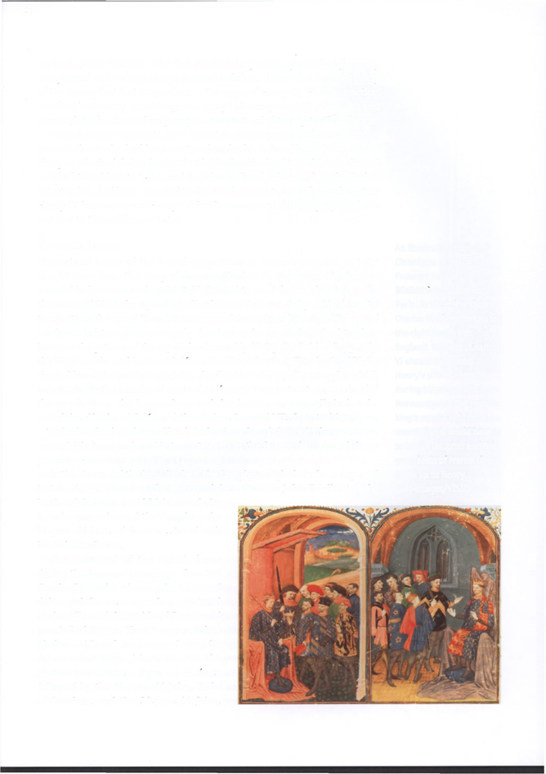Henry V: The Background, Strategies, Tactics and Battlefield Experiences of the Greatest Commanders of History Paperback (17 page)
Authors: Marcus Cowper
Tags: #Military History - Medieval

being exposed.
(Author's collection)
In June 1407 Prince Henry laid siege to Aberystwyth, using siege cannon
against a fortress in England for the first time, and following its fall in the
summer of 1408 the Welsh revolt became a protracted guerrilla war, with
Glendower himself fading into the background. In February 1409 Harlech
fell, along with many of Glendower's relatives, and Edmund Mortimer died,
though Glendower himself remained at large and, according to the chronicler
Adam of Usk, he died in 1415, possibly at the estates of his daughter
and son-in-law in Herefordshire. Glendower has since become a symbol of
Welsh national pride, particularly since the establishment of a separate Welsh
parliament in 2000.
50


English magnates
The nature of Henry Bolingbroke's accession to the throne as Henry IV in
September 1399 had caused a rift in the aristocratic community of England
that would not be fully healed until the culmination of the Wars of the Roses
in 1485. Those who supported the ousted king, Richard II, those who supported
the superior claim to the throne of the houses of Mortimer and York, and even
those who had supported the Lancastrian pretender, but felt they had not been
rewarded enough for doing so, all at one stage or another set themselves up in
opposition to Henry and his father.
Perhaps the most famous of these aristocratic adversaries was the Percy
family of Northumberland. The Percys had been a major power in the north of
England since they had gained their estates in the Norman Conquest. Richard
II had created Henry Percy Earl of Northumberland in 1377, when he was also
created Marshal of England. However, Northumberland had fallen out with
Richard over his creation of Northumberland's great northern rivals the Neville
family as Earls of Westmorland in 1397, and when Henry Bolingbroke returned
to seek his lands in 1399 Northumberland was one of several powerful
magnates who sided with him, though it is unclear if Northumberland expected
Bolingbroke to take the throne.
Henry IV, as he was now known, had attained the throne based upon
Richard II's failings and Henry's own legitimate claims, but right from the
start his reign was plagued by political instability with the first signs of open
aristocratic revolt coming in December 1399 when the Earls of Salisbury,
Kent, Huntingdon and Rutland plotted to kill Henry at Windsor. Learning
of the plot through Rutland, Henry managed to escape and the remaining
earls were executed. This first rebellion provoked the death of Richard II,
who up until that point had been kept alive, and he was certainly dead by
17 February.
On 14 September 1402 the Percys defeated a Scottish incursion at the battle
of Homildon Hill. The force, commanded by the Earl of Northumberland and
his son, Henry 'Hotspur' Percy, captured five Scottish earls and Henry IV
demanded that they surrender their prisoners to the crown, thus depriving
them of the potential ransom for them. Hotspur refused to hand over his most
important captive, the Earl of Douglas, causing a breach between the Percys
and the throne, a breach that had its beginnings in debts owed by Henry IV
to the family, as well as his refusal to ransom Hotspur's brother-in-law, Sir
Edmund Mortimer, from captivity in Wales.
This estrangement erupted into open revolt in 1403, when Hotspur, along
with his uncle, the Earl of Worcester, sought to join forces with Owen
Glendower and overthrow Henry IV in favour of the Earl of March. The issue
was decided at the battle of Shrewsbury (pp. 10-13) where Prince Henry won
his spurs. Shakespeare has Prince Henry and Henry 'Hotspur' as equals, with
Henry IV comparing his own son unfavourably with the young Percy:
In envy that my Lord Northumberland
Should be the father of so blest a son:


A son who is the theme of honour's tongue;
Amongst a grove, the very straightest plant,
Who is sweet Fortune's minion and her pride,
Whilst I, by looking on the praise of him,
See riot and dishonour stain the brow
Of my young Harry. O, that it could be proved
That some night-tripping fairy had exchanged
In cradle-clothes our children where they lay,
And called mine Percy, his Plantagenet:
Then would I have his Harry, and he mine.
1 Henry IV,
I. i. 78-88
Shakespeare also has Prince Henry encountering Hotspur on the field of
Shrewsbury before defeating him in single combat:
For worms brave Percy. Farwell, great heart!
Ill-weaved ambition, how much art though shrunk?
1 Henry IV,
V. iii. 88-89
However, Henry and Hotspur were not contemporaries, with Henry being only
a teenager at the battle of Shrewsbury and Hotspur in his late 30s or early 40s.
It would also seem likely that if there was a chance that they had met in combat
it would be mentioned in the various chronicles that deal with the battle.
Northumberland had been implicated in Hotspur's revolt, but the loss at
Shrewsbury left him isolated and he made his peace with Henry IV at the
expense of some of his lands and titles. However, the deaths of his son and
brother ensured that he would not long remain docile and in 1405 he sided
with Glendower and Mortimer once more, and supported a rebellion in the
north in conjunction with Thomas Mowbray, Earl of Nottingham, Lord Bardolf
and the Archbishop of York, Richard Scrope. Their conspiracy was thwarted
through the efforts of the Earl of Westmorland, and Henry IV had Scrope and
Mowbray executed, while Bardolf and Northumberland fled to Scotland.
Northumberland had one final try at overthrowing the Lancastrian dynasty,
venturing south in February 1408 with Bardolf once more. However, their force
was decisively defeated at the battle of Bramham Moor on 19 February, with
Northumberland being killed and Bardolf later dying of his wounds. This was
the last major rebellion of Henry I V's reign, but the tension caused in
aristocratic circles over the executions, notably that of Richard Scrope, would
carry over into the reign of Henry V and culminate in the Southampton Plot
of 1415.
On 31 July 1415, just prior to Henry's departure for France, the young Earl
of March confessed his involvement in a threat to Henry's crown organized
by Richard, Earl of Cambridge, Sir Thomas Grey, Lord Clifford and Lord Scrope
- nephew of the executed Archbishop Scrope and one of Henry's closest
advisors. The aim of the plot was to put the Earl of March on the throne in
place of Henry, with support from the Scots and the Welsh and the Lollards


under Sir John Oldcastle, who had rebelled the previous year. Though overly
complicated and perhaps always doomed to failure, the revolt contained many
of the names that had cropped up in the reign of Henry IV. Henry's reaction
was swift, with Grey, Cambridge and Scrope all being arrested, sentenced and
executed, in the one and only major aristocratic rebellion against his throne.
Indeed, Henry appears to have undertaken a programme of reconciliation
towards those who had been attainted under his father. Henry Percy, son of
Hotspur, who had fled to Scotland with Northumberland in 1405, was allowed
to take his earldom in 1416, and Sir John Holland, whose father, the Earl of
Huntingdon, had been executed for his involvement in an early revolt against
Henry IV, became one of Henry's ablest lieutenants in the campaign and was
restored to the earldom in 1416.
French lords
An illustration from the
The natural leader of the French opposition to Henry's invasion of 1415
Chroniques
of Jean should have been the King of France, Charles VI. However, Charles was Froissart held in the